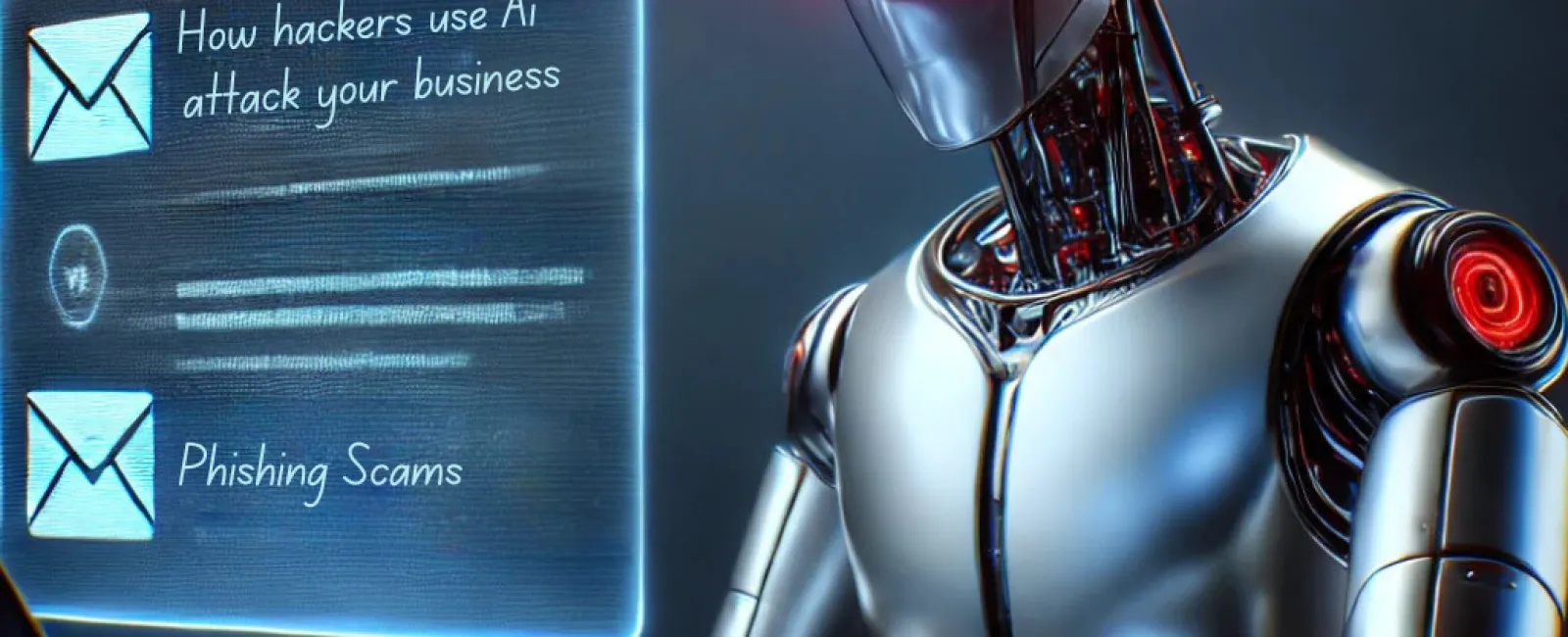January 20, 2025
If you believe that hackers are only interested in Fortune 500 companies, it's time to reconsider.
With the rise of artificial intelligence, cybercriminals have gained unprecedented capabilities to scale their attacks, making small businesses prime targets. These criminals recognize that small businesses lack the extensive resources of larger corporations, yet they still possess valuable data that can be exploited.
Gone are the days when hackers relied on poorly crafted emails or basic password-guessing techniques. AI equips them with advanced tools that allow them to outsmart and outmaneuver businesses that are unprepared. Without a strong defense, your organization could easily fall victim to these attacks.
Here's how hackers are leveraging AI and how you can safeguard your business from becoming their next target.
AI-Powered Phishing Scams
Traditional phishing attempts often featured generic, poorly written emails, frequently riddled with spelling and grammatical errors. AI has significantly improved these tactics, enabling hackers to create highly personalized and convincing messages aimed at specific individuals. They utilize AI to:
- Gather personal information from social media and business websites.
- Craft emails that imitate real contacts or reputable brands.
- Adjust language and tone to appear authentic.
Picture this: you receive an email that appears to be from your bank. It's addressed to you, includes your company name, and references a recent "transaction attempt" that failed. It prompts you to "click here to confirm your information" or "update your credit card details to prevent account suspension."
Here's how the attack unfolds:
- Clicking the link directs you to a counterfeit website that mimics your bank's login page. Once you enter your credentials, hackers capture your username and password.
- Alternatively, the link might install malware on your device, granting hackers access to your data, keystrokes, or even your entire network.
The outcome? Hackers could drain your account, steal sensitive business information, or launch further assaults on your organization.
Automated Vulnerability Scanning
Hackers are now using AI to automate the scanning of small businesses for vulnerabilities. AI-driven tools can:
- Detect outdated software or weak network setups.
- Target these weaknesses more swiftly than ever.
For small businesses with limited IT resources, this makes them easy targets for automated attacks. Hackers can pinpoint and exploit vulnerabilities within minutes, gaining access to your systems before you even realize there's a problem. This can lead to costly downtime, data breaches, or even total loss of network access.
AI-Driven Malware
AI enables hackers to develop malware that can quickly adapt. These malicious programs can:
- Evade detection by learning how antivirus software operates.
- Change in real-time to exploit emerging vulnerabilities.
The real danger? AI-enhanced ransomware can lock down systems more rapidly and demand ransoms more effectively, putting small businesses at heightened risk.
Deepfake Technology For Social Engineering
AI-generated deepfake videos and audio are no longer just for entertainment. Hackers are employing this technology to impersonate executives or trusted contacts, persuading employees to:
- Transfer funds.
- Disclose sensitive information.
Consider this scenario: your CFO receives a call from someone who sounds exactly like your CEO, complete with their tone, phrasing, and urgency. The "CEO" instructs the CFO to urgently wire funds to a vendor to finalize a significant deal. The voice is so realistic that the CFO complies without hesitation, only to later discover that the funds were sent to a fraudulent account.
Deepfakes make these scams alarmingly plausible, leaving even the most vigilant employees susceptible to manipulation.
Advanced Password Cracking
AI-driven algorithms can rapidly guess passwords. By employing techniques such as pattern recognition, hackers can crack even moderately secure passwords.
Tip: Multifactor authentication is no longer just a recommendation—it's crucial in combating this escalating threat.
How To Protect Your Business From AI-Powered Cyberthreats
1. Invest In AI-Driven Defenses: Utilize cybersecurity tools that harness AI to detect and respond to threats in real time.
2. Educate Your Team: Train employees to recognize phishing attempts and social engineering strategies.
3. Conduct Regular Audits: Frequently evaluate your IT infrastructure for vulnerabilities.
4. Strengthen Authentication: Implement multifactor authentication and promote the use of strong, unique passwords.
5. Partner With Experts: Managed IT providers can assist small businesses in staying ahead with proactive monitoring and security solutions.
AI is reshaping the landscape of cybersecurity for both attackers and defenders. While hackers are using AI to exploit vulnerabilities, businesses can also leverage it to enhance their defenses. Staying informed and proactive is essential for safeguarding your business in this continuously evolving digital environment.
Ready to fortify your business? Click here or call our office at 214-845-8198 to
schedule a FREE 15-Minute Discovery Call today to ensure your defenses are AI-proof.



